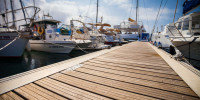How To Live on a Sailboat: Consider These 5 Things
"Someday I want to move onto a sailboat and sail off into the sunset...”
It's a common dream shared by thousands, even millions of sailors and non-sailors world-wide. And it's a compelling dream shared by so many, but what does it really take to do it? What does it even mean to live on a sailboat?
There's a strong "paradise mythology" that surrounds cruising and living aboard. That it's an easy lifestyle, with days spent in your swimsuit and sunsets under palm trees with a rum drink in your hand is a common idea. The reality is pleasant and worth it, but it's a far cry from the myth.
With this guide, I'll give you some insight from years of experience living on board so you can figure out if it's something that really is practical for you, and if it is, what you need to start thinking about.

On this page:
Liveaboard or Cruiser?
There are two basic ways to live on a boat, though there is a spectrum from each extreme to suit anyone's taste. At one end, you have the "Liveaboard," someone that lives on a boat instead of a house but rarely moves. At the other end are the "Cruisers" who roam the world under sail. This article focuses on the Cruising lifestyle, though much applies to liveaboards in marinas.
The Liveaboard
Someone who lives on board a boat full-time may never leave the marina. This lifestyle isn't so different from life in an RV in a park on land or a tiny house. You don't have the trappings of owning a home, and you live in a small space. But you may have a day job, a car, and you can keep plants on the dock next to your slip and have cable. You need not be in a sailboat, as a powerboat or houseboat will do the job just fine.
This article isn't about setting you up as a modern-day Travis McGee, though there is much to recommend the lifestyle. Your needs differ greatly from someone who takes their boat places. You will have ready access to parts, service technicians, and grocery stores, for example.
The Cruising Lifestyle
Cruising means moving your boat from destination to destination, whether it's in one region or across oceans. You won't have a year-round slip you return to, though some do come to the same place for a time every year. You can cruise in a sailboat or a powerboat, but the blue water cruisers who cross oceans are almost exclusively in sailboats.
This is very different from living in a marina. It turns your whole financial world on end since you can't easily work in a building on land year-round, and you have a lot more planning and equipping to do since you will move around. You may just move up and down the inter-coastal waterway, or you may sail around the world - the issues are similar.
Most cruisers also avoid marinas regularly as they are a very expensive way to spend the night in your own boat. Nothing eats through a cruising kitty more quickly than marina time. So many of us prefer to be at anchor, which adds its own challenges.
To get an idea of what it costs to dock your boat in different types of locations, check out our article on How Much it Costs to Dock Your Boat for a Year.
The Hybrid Life
We've had a few cruising friends who have lived a combination of the liveaboard lifestyle and cruising. Some will live on board part of the year, or live in a marina part of the year and cruise the rest of it. The combinations are limitless, but much of the Cruising lifestyle applies since the boat moves around.
The Basics of Living on Board and Cruising
Living on a boat - even in a marina - requires a hard reset of some of your lifelong habits. There are a million little details that are different, but there are a few major areas that you should know in advance.
Space Management and Your Things
Coming from a house or apartment, you must downsize. Space is everything on a boat, and you can't have piles of stuff loose in the boat when you go offshore. Devices need a dual function or more, and you can't afford to have excess things around since you'll also need space for spare parts, food storage, and safety gear.
When we moved on board, we:
- Got rid of all but a handful of our pleasure books. This was painful, but with limited shelf space, there's little room beyond mechanical texts, sailing books, and navigation and maintenance related reading. Fortunately, we'd begun the move to Kindles well before we moved on board.
- Pared our clothing down to minimal cold weather clothes and tropical clothing.
- Pulled all our CDs and DVDs out of cases and stored them in compact organizers. Eventually, we ripped all the CDs and went digital.
- Eliminated most kitchen gadgetry. With power limitations, it lowers your small appliance needs. But you don't have room for single-purpose items like salad spinners or big serving dish sets.
- The kids got rid of all the aged-out toys, and many of the current ones. Ours were older at twelve and fifteen, so they didn't have so many large things to take with them as younger children would have.
- Simplified our coffee making to a French press, eliminating the Keurig and regular coffee maker we had in the house.
- Reduced duplication in my tools and pared them down.
- Picked only a select few sets of linens, towels, and cloth napkins.
Those are just a few examples of some of the downsizing and re-thinking we had to do about the accumulation of "stuff" that most people view as necessities. We've also learned different attitudes about acquiring new things, as everything needs a place on the boat when we get it.
You will take too much with you when you cast off your lines, but over time you'll learn you can do with a lot less.
Changing Habits and Resource Management
Every time we come back to land, we realize how much our daily habits have changed. We don't run the water when we brush our teeth; we turn off every light when we leave the room. The little bits of daily life on land you don't think about come out when you live on board.
The big habit changers are water use, power consumption, and waste management. In a house, when you flip a switch the lights come on, when you flush the toilet the contents go ... somewhere. You don't really think about these things, the water will always come out of the tap as long as you pay the water bill or don't run the well dry.
As a liveaboard, you learn how unpleasant it is to run out of water in the middle of a shower, or have the low battery alarm come on in the middle of the night. We won't even go there about overfilling the holding tank. The responsibility to make or provide things and services you don't even think about on land forever changes the way you live.
Food, Spares, and Supplies
People ask us "what do you do for food while you're out there?"
The good news is, everybody eats. The bad news is, it's not always what you are used to eating or how you're used to eating it. Any place with people you can get food, but it takes more planning to make sure you've got what you want when you want it.
Anchored in a remote atoll in French Polynesia you actually can go ashore and buy flour. If it's not too close to when the weekly ship comes and no one else has bought it all. You can get meat and vegetables if you are willing to pay the high prices. To make your life more manageable requires foresight, since you can't just hop in the car and pop down to Stop & Shop if you run out of eggs.
Spare parts and other supplies also take planning and management. Carry spares with you, and know you will run out and find alternatives. You'll learn how to navigate importing parts and spares, and how to improvise repairs when you can't. But figuring out what you will need and buying it when you can to stock up is a never-ending challenge.
Useful Skills and Knowledge
Living on board and cruising requires many different skills. Some you must have to cruise safely, others will save you time, aggravation and money. You can train and prepare, but nothing replaces hands-on experience.
Repairs and Maintenance
We planned for years to cruise. Part of my preparation involved courses at a local vocational school. Not everyone has the time or resources to take it to this level, but the courses on diesels, electricity, household systems, fiberglass and outboards have all paid for themselves in the years since. From sorting out my submerged outboard in Sydney when I couldn't find a vendor to service it, to rebuilding a water pump in the Tuamotus or troubleshooting and repairing the autopilot, it's been invaluable having these skills.
Even if you can't take professional-level courses, you will need to take some time to update your skills. If you aren't "mechanically inclined," then maybe your partner is. You can't rely on others for basic maintenance tasks, and you want to speak knowledgeably when things beyond your skill to repair break in foreign countries and remote places.
Navigation, Weather and Sailing
These are basic sailing skills, but it no longer surprises me in the day of YouTube and Patreon cruisers how many disregard their importance before setting sail. Time and again on social media discussions focus on what type of boat to buy without regard to the ability to sail it safely from point A to point B.
Perhaps I'm conservative, but knowing your boat and how it handles is critical. So is knowing how to find your way safely between ports while avoiding dangerous weather.
If you're newer to sailing, take classes. Sailing classes, navigation classes, even weather classes if you can. There are good online resources if time and budget limits you, but take steps to learn about what you're getting into. The Seven Seas Cruising Association, the American Sailing Association, and many other resources offer training courses on the web. Though there's no real substitute for time on the water, you can get many of the basic ideas to start.
If you want to get started immediately on the cheap, we have a great article on 9 Ways to Learn to Sail for Practically Free. There, you'll find a bunch of good resources to get you started. But nothing beats the real thing.
Charter a boat, or better yet if you live near water get your cruising boat a year or three before you're ready to leave and spend some time getting intimate with its systems. Sail it places, take long trips with overnight passages.
Provisioning
Cooking on a boat differs from cooking in a kitchen in a house. It's not just the lack of counter space, specialized gadgets, cooktop space, refrigerator capacity, enough burners, or a large oven. You have to re-think how you shop, what you eat, how you prepare it, and how you store it.
We've learned to make many of our favorites from scratch, whether it's pancakes, tortillas, or bread. The conveniences we have on land when a supermarket is a short drive away disappear or become very expensive. When cruising, time is an ingredient you have plenty of and we've discovered joy in making something better from scratch than you can buy in a package.
A collection of staples you can make things from not only saves you money, but saves you space since you're storing the components (flour, butter, baking powder, rice, pasta, cocoa, sugars, spices) instead of bulky boxes of cake mix, pancake mix, and shortcut rice and pasta dishes. With those basic elements we can make anything from a killer chocolate cake to one-pan copycat hamburger recipes.
We've also learned little tricks like having cream of tarter and baking soda to make our own baking powder, since baking powder doesn't last long in humidity. You pick up tips for what works in a lot of places, from other cruisers over sundowners to the internet to cooking forums on the web. We're always looking for better ideas and willing to share ours.
Our freezer is our top consumer of power, but it also allows us more flexibility and time in remote places. Meat and cheese bought in Panama carried us halfway across the Pacific, but it took planning and packing to make it work.
What Kind of People do Well as Liveaboards?
This is a tough question, because there are so many ways to cruise, and so many ways to solve problems when you live aboard. Someone with a large cruising kitty needn't be as self-reliant as someone in a small boat on a shoestring budget ... but they may still want to be. And "living aboard" can mean many things to different people.
Self Reliant & Independent
A liveaboard who can't solve problems and manage life without outside help will struggle. The assumption "out there" that you have some idea what you are doing. Cruising the world has a lot of alone time, outside the reach of others. There isn't always a lifeline.
Low Maintenance
Physical limits of storage, space and power prevent bringing a massive shoe collection or a full array of must-have gadgetry. Most of us don't have a lot of formal wear or fancy clothes on board, it just isn't practical. Not wearing shoes is a life goal.
Most cruiser gatherings are low key, impromptu, and informal. There's not a lot of room for fussing, and not a lot of judgment about what clothes or jewelry you wear. "Dinghy Hair" is a thing when you travel everywhere over in a small open boat, so most of us don't aim for a flawless hair look.
Minimalist
You don't have room to take everything with you. You will not have room for everything you want. You need to prepare for tough choices about what you need versus what you want. So if your wants are simple and you can live without many of the things we accumulate in modern society it will be an easier transition for you. If you take joy in the simpler things in life, you'll fit right in.
You can have a comfortable life though. Cruising shouldn’t mean camping, and most cruisers live in comfort. But it requires a more complex boat, driving up size and price. The more minimalist your viewpoint on life and possessions, the easier it is to live to a tighter budget.
Is The Liveaboard Life for You?
The final decision is different for everyone, and the liveaboard lifestyle you choose will be unique to your personal habits and financial means.
To come up with an answer requires time spent the reality and exploring your own wants and realistic expectations. If it's the right choice for you, you won't notice the things you leave behind and you'll enjoy the things you learn.
There are other alternative lifestyles to choose from. Porch.com published a good Q&A article about it (featuring us as well), so if you're unsure whether boating is for you but like to explore other options, check out their article about alternative housing here.
Did you find the answer to your specific question?
👍 29 👎 2



Comments
Dom
Hi William,
this is super interesting - thank you so much for sharing.
As I am starting my sailing education with a goal to go cruising full time in a few years, I wanted to ask you a quick follow-up question. You mentioned you took some “courses on diesels, electricity, household systems, fiberglass and outboards” - could you please share more information on this? I’d love to take this kind of courses as well and would love to hear more about the specific recommendations you have.
Thanks!!
Dom
William Porter
Hi Dom,
I took some courses at a local vocational technology school that had an associates degree program in Marine Technology - New England Institute of Technology. The typical profile of a student there was someone looking for a career working on and fixing boats, so the courses were in depth and technical with hands on lab work that made a big difference in how much I learned.
It was expensive and time consuming - I was considered a full time student while I was taking the courses - but well worth it.
While not everyone has the time to do that, there are other courses that you can take on nights and weekends to sharpen up your skills.
Philip
Hi William,
Thanks very much for writing this as it was eye opening and informative.
I’m 53, from Pennsylvania, a professional chef who’s semi retired as of this year. I’ve been thinking about buying a used bluewater sailboat as it’s been a dream of mine since I was a teenager. After reading your article I’m a little concerned that I may not have enough time at my age to learn everything that needs to be learned to sail safely. I’m fairly good at fixing things and problem solving but I’ve never taken pro courses for diesel, plumbing, electric, although I’ve fixed similar things in my business and home over the years. Most importantly I’m not a sailor but was planning on getting trained. I’m conservative as well as an old Boy Scout that likes to be prepared whether it’s prepping for a wedding of 350 or sailing across the Atlantic. Do you think I’m possibly too old to get properly ready for this undertaking or am I overthinking which is something I often do because I want everything to be right?
Shawn
Hi Philip,
It’s Shawn here from Improve Sailing.
I don’t think you’re ever too old to learn, especially since the characteristics you’ve listed would make you particularly well disposed to learning the various fundamental sailing skills. When you’re ready to start learning, you can take a look here: https://improvesailing.com/sailing
Best of luck with your sailing dream,
Shawn
Morgan
Hi William! Just a quick question, how do you shower in the winter times?
Leave a comment